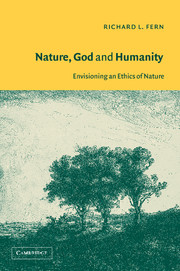3 - Ecological wisdom: a methodological interlude
Published online by Cambridge University Press: 22 September 2009
Summary
UNRESOLVED QUESTIONS
Humane holism looks to integrate and clarify, not supplant our intuitions regarding the moral significance of wild nature. These include: that it is wrong to inflict suffering on any creature without a good reason; that those non-human animals with whom we enter relations of reciprocity have a just claim to be treated fairly; that we ought to honor the good of all living creatures; that in situations of conflict human life and interests count for more, morally; that our own identity and well-being are bound up with that of the Earth and accordingly, we ought to cherish, not degrade wild nature. In so doing, humane holism aims to avoid one-sided moralisms. That questions remain is clear.
For one thing, there is the question of determinacy. Can humane holism move beyond indeterminate generalities of decency, deference, and necessity? If philosophical ethics cannot resolve the problem of comparative moral force, how are ethically serious people to find their way through the complex uncertainties of this world? By way of addressing this and related concerns, Parts II and III situate the programmatic principles of humane holism within an all-encompassing, faith-based perspective, theistic naturalism. What this involves will become clearer with time, though to start it is important to distinguish between a “scientific naturalism,” centeredon the denial anything exists other than what can, in principle, be discoveredb y way of scientific inquiry, anda much broader, less theoretically laden naturalism, defined by the belief that humans are “continuous with anda t home in nature” (Kohák 1984: 7f.). Theistic naturalism is naturalistic in the secondb ut not the first sense.
- Type
- Chapter
- Information
- Nature, God and HumanityEnvisioning an Ethics of Nature, pp. 69 - 102Publisher: Cambridge University PressPrint publication year: 2002

